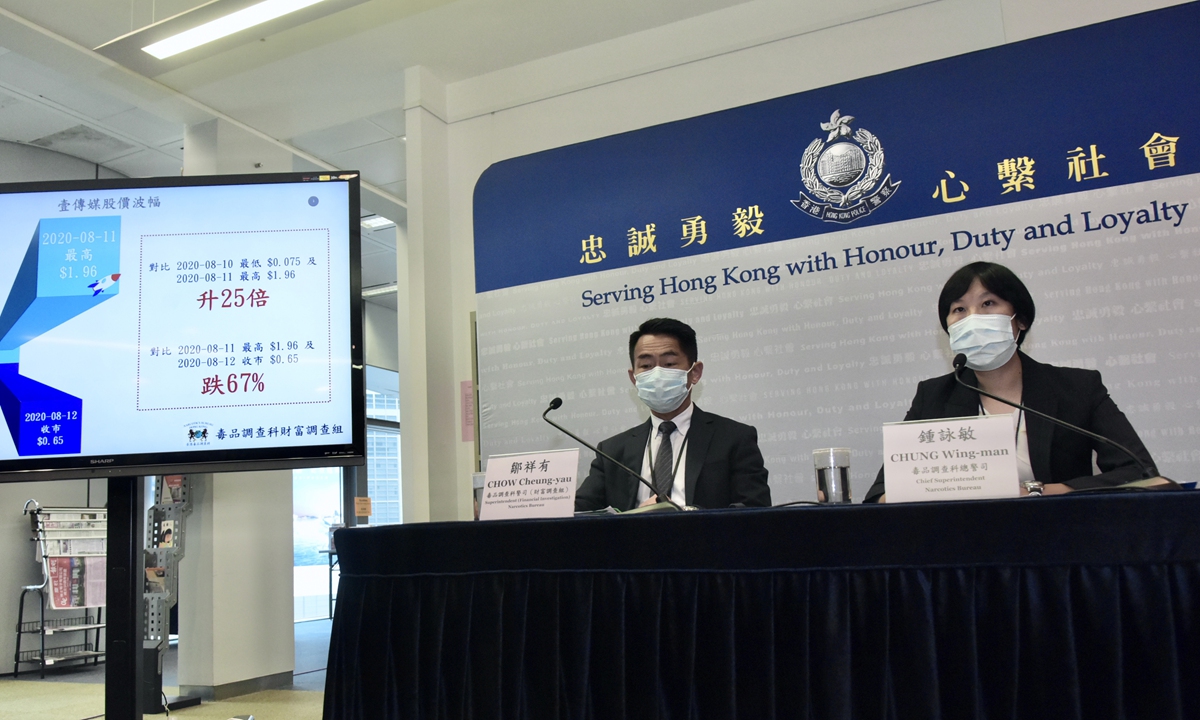HK police revise rules to counter fake journalists, a move overdue
By Wang Qi and Chen Qingqing Source: Global Times Published: 2020/9/22 18:36:12

Hong Kong police attend a Thursday briefing about the arrest of 15 people in connection to the surge in shares of Next Digital. Photo: cnsphoto
Hong Kong police said they will redefine the criteria for "media representatives," who are allowed to cover incidents with police, and recognize only news media registered with the Hong Kong SAR government, or internationally recognized foreign media, in a bid to allow frontline law enforcers to identify real journalists during their operations and provide assistance efficiently.
Kenneth Kwok, chief superintendent of the Police Public Relations Branch, said on Tuesday that only local reporters and photographers who have registered with the Hong Kong SAR government's news system or well-known international media outlets shall be recognized as media representatives, according to a statement sent by the Hong Kong Police Force to the Global Times.
Under the new rules, certificates issued by the Hong Kong Journalists Association and Hong Kong Press Photographers Association will be no longer acceptable credentials.
The change will come into effect as soon as Wednesday, according to local media.
Hong Kong police said that since the social unrest and violence started in June last year, they have found people claiming to be journalists mingling with crowds, obstructing police's law enforcement operations and even attacking police.
In May, the Hong Kong police media communication team was expanded to more than 300 members in order to provide adequate on-site support to the media at major public events, media reported.
"Apparently, during the social unrest last year, there were many rioters and protesters who pretended to be journalists and intruded law enforcement, or held a biased attitude toward the HKPF," Joe Chan Cho-kwong, former chairman of the Junior Police Officers' Association, told the Global Times on Tuesday.
In Hong Kong, authorities have a lax criterion for verifying journalists, and whoever launches an online blog could claim to be a journalist, and the new rules will help find a balance between law enforcement and protecting freedom of speech, Chan said.
The police said that the revised definition of "media representatives" would be made much clearer to enable frontline police officers to identify valid reporters more effectively and quickly, so as to facilitate and assist media representatives as much as possible without compromising the efficiency of police's law enforcement operations.
Amid the social unrest in 2019, some Hong Kong reporters, "fake journalists" and foreign reporters became accomplices as they hindered police operations in the process of law enforcement, verbally attacked police and government officers, and sent police-related information to rioters.
For instance, in August 2019, after clashes between police and protesters in Tsuen Wan, some protesters chased police officers and attacked them with batons, sticks and umbrellas. However, some so-called journalists with a biased attitude reported it was the police who targeted journalists first and distorted the narratives. The Global Times reporters also saw several times during the anti-government protests that some black-clad rioters suddenly put on yellow vests pretending to be journalists to escape from the HKPF.
Some analysts say that journalists are not supposed to obstruct law enforcement or abuse their power through spreading fake news, let alone assaulting police.
"The overdue rules would help weed out fake journalists and regain people's trust in media outlets," a local resident said.
RELATED ARTICLES:
Posted in: HK/MACAO/TAIWAN